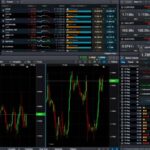Australia is a typical commodity-exporting country, particularly for its abundant minerals. Therefore, commodities stand out as one of the best asset classes that Australian traders can explore.
Australia’s top export partners are predominantly in Asia, including China, Japan, Korea, and India. As a result, commodity prices exhibit a strong correlation with the economic trajectories of these nations.
Best commodities for Australian traders
When considering trading commodities, it’s wise to go for those with high trading volumes, reliable shipping records, and easy accessibility. Below are some of the most heavily traded commodities on the Australian financial markets.
Gold
Gold is my favourite commodity due to its critical role in making a diversified portfolio. It serves as a key indicator for risk sentiment.
Gold often experiences a surge during stock market downturns as it is considered a haven asset. Additionally, gold typically exhibits a negative correlation with the US dollar. Additionally, gold is one of the most popular precious metals that may suit an active trader because of its high liquidity.
Its price chart usually displays textbook technical patterns, providing traders with opportunities to analyze potential future trends based on historical movements.
For retail traders, gold is available through most CFD providers. Gold ETFs and Australian gold miners can be other ways to invest in gold.
Copper
I like copper due to its essential role in industrial metals and indications for global economic trajectory.
Copper’s movement reflects global manufacturing activities, typically in China. The movement of copper often mirrors global manufacturing activities, particularly in China. Its price tends to rise during economic booms due to increasing demand, and vice versa.
Copper is more volatile than gold due to smaller trading volumes and its association with economic events such as supply disruptions and technological advancements. The metal is also provided by more CFD providers in Australia.
But you could consider trading mining stocks of BHP and Rio, which are usually positively correlated with copper prices.
Crude Oil
I cannot avoid putting crude oil on the list as the market is such an important part of the global macro landscape.
Oil usually moves in the opposite direction to gold, making the two commodities effective hedging partners in trading. However, the strategy does not always apply depending on the macro background.
From the Russia-Ukraine war to the Gaza-Israel conflict, oil plays a critical role in these geopolitical events. The oil markets are more in response to fundamentals than technical implications, driven by supply and demand factors.
Oil prices can be very volatile to react to these geopolitical events and news. Again, China’s economic trajectory has a significant impact on oil demand outlooks, given its status as the world’s largest oil importer.
Both benchmark crude oil, including WTI and Brent, are accessible in OTC providers such as major CFD platforms in Australia.
Natural Gas
I would also consider gas as a good commodity for Australian traders, given that Australia is the second largest exporter of Liquid Natural Gas (LNG), following the US as of October 2023, according to Statista.
Natural gas prices are significantly impacted by the dynamics of supply and demand. The Russia-Ukraine war had sent natural gas prices to a record high in late 2022 before oversupply became an issue in 2023, pressing its price to a record low.
Gas prices have been very volatile in recent years due to geopolitical tensions. However, this could provide trading opportunities for active traders.
Natural gas is one of the most popular instruments provided by major Australian CFD providers.
Disclaimer: This is not investment advice and should be read as general information.
Tina was a Market Analyst at CMC Markets from 2015 to 2024, providing client education, market commentary, and media presentations. She specializes in technical analysis and market fundamentals. Tina believes financial markets comprise a vast area reflecting economies, politics, history, psychology, and philosophy. As a result, her analysis is based on her interpretation of a specific country’s economic and historical background, alongside investor sentiment and behaviour.
Tina’s expertise has garnered recognition, with her commentary frequently quoted by reputable sources like Bloomberg, CNBC, Routers, WSJ, and AFR. Her insights span a diverse spectrum, covering various financial domains, including stock markets, foreign exchange, commodities, and cryptocurrencies. Previously, she also spent significant time with China Central Television. This experience allowed her to develop a deep understanding and insight into China’s economics and business.



